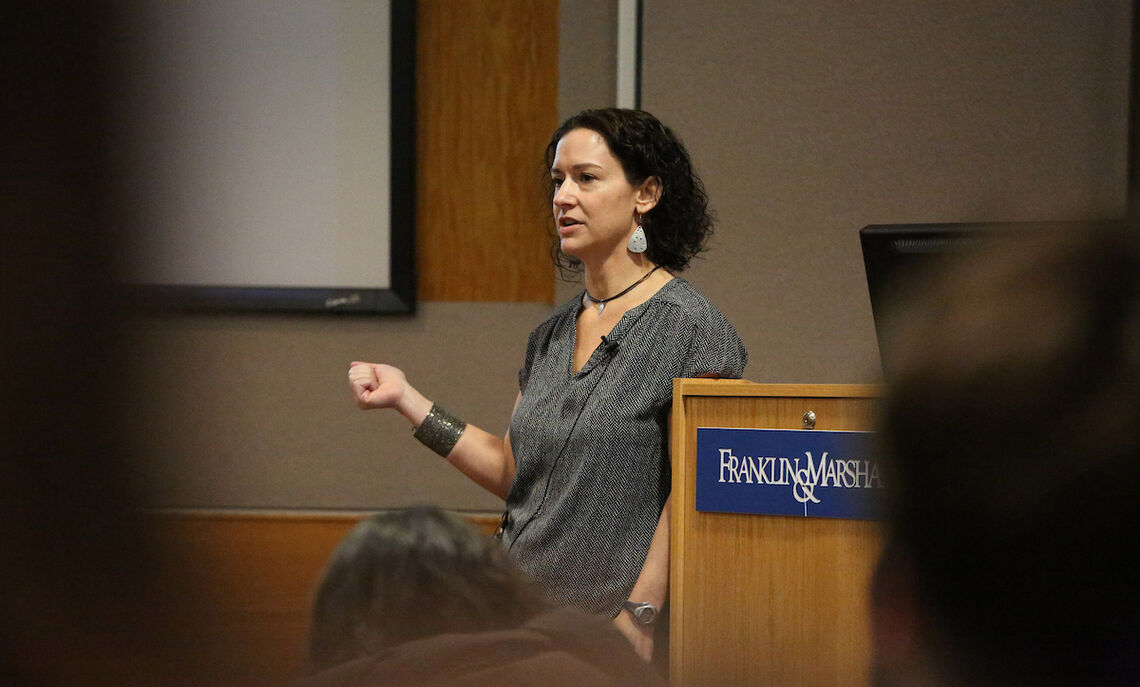F&M Stories
Do Chimpanzees Grieve Like Humans?
A study of wild chimpanzees led by a Franklin & Marshall College professor and her student researchers suggest that chimpanzees may grieve similarly to humans.
"Mothers give behavioral indicators that they are aware the infant is dead, but still transport, and sometimes groom and protect, their deceased offspring for hours to days after death," said Associate Professor of Psychology Elizabeth Lonsdorf. "We propose that these behaviors may represent a nonhuman primate analog of human grief."
It was long believed that animals are incapable of grief, "that the capacity to understand death is uniquely human: 'Mortals are they who can experience death as death. Animals cannot do this,'" to quote philosopher Martin Heidegger.
However, the authors write, years of scientific observation of animals has raised questions about this uniqueness and demands "a broader understanding of the evolutionary roots of death concepts and practices."
Over the past several decades, according to Lonsdorf, the scientific study of death "has expanded dramatically and reports of nonhuman responses to death have begun to accumulate across a variety of species."
Lonsdorf and her team, Tessa Grebey '16 and Josephine Delaney-Soesman '19, combed through decades of long-term data from the Jane Goodall Institute's Gombe Stream Research Center in Tanzania, where primatologist Jane Goodall has been doing research since 1960.
"One of the reasons I chose to attend F&M was the potential to be able to work closely with Professors and to contribute to their research. I was extremely lucky in being able to assist Professor Lonsdorf and work closely with her on one of her projects," said Delaney-Soesman, who is now working as a veterinarian assistant in New York as she considers graduate school.
"The experience was above and beyond anything I could of hoped for," she said. "I was able to learn how to think critically and take on different approaches to research while under her guidance."
The F&M researchers created the largest existing dataset of infant corpse-carrying in wild chimpanzees. For the first time, they were able to examine a single species and several of the existing hypotheses as to why this behavior occurs.
"None of these existing hypotheses, having to do with post-partum hormones, mother-infant bond strength, seasonal influences, or unawareness of death, were supported by our data," Lonsdorf said. "Thus, we suggest that these behaviors may be akin to human grief."
Along with the F&M team, collaborators from the University of Minnesota, Duke University and George Washington University contributed to this work, which was recently published in Royal Society Open Science, "Why chimpanzees carry dead infants: an empirical assessment of existing hypotheses."
Related Articles
April 12, 2024
Senior Spotlight: Micheala Patalano
Micheala Patalano shares how music at F&M, particularly singing and performing with the a cappella group Sweet Ophelia, helped the College feel like a true home.
April 2, 2024
‘Pursuing the Animal Husbandry and Primate Training Certificate Was a No-Brainer.’
Shoshana Frank has always known that she wanted to pursue a career in an animal-related field. To complement her animal behavior studies major and caretaker duties in F&M’s Vivarium, Frank decided to pursue F&M’s animal husbandry and primate training certificate. “The certificate program provides students with an experiential component that builds on the foundational knowledge we gain from our classes,” she said.
March 26, 2024
Sarah Tasker Awarded NSF CAREER Grant for Chemistry
A laboratory discovery has resulted in a prestigious National Science Foundation CAREER grant for Sarah Tasker, assistant professor of chemistry at F&M.

